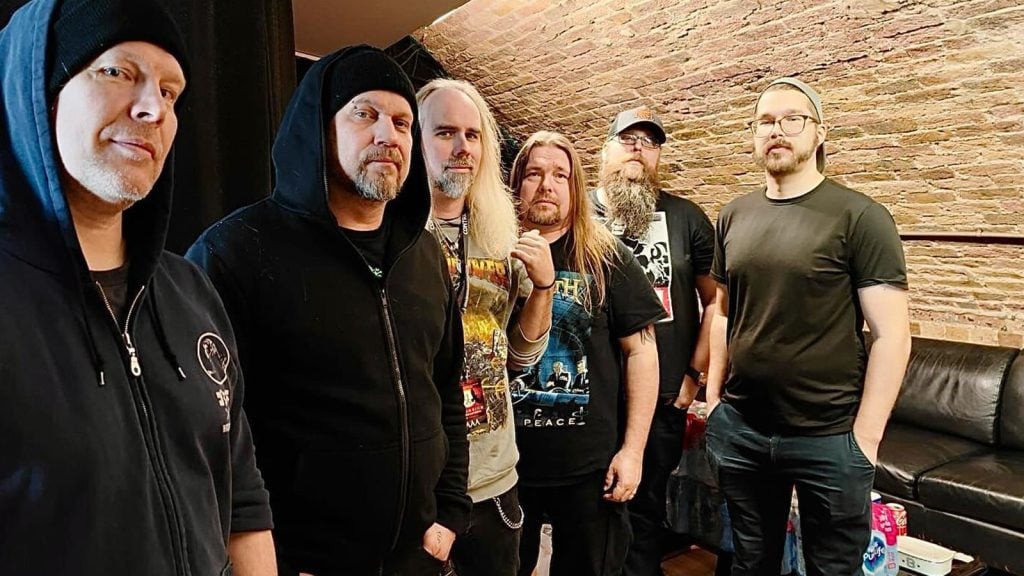
JIM ROOT Talks Balancing Chaos & Creativity In SLIPKNOT’s Songwriting Process

Slipknot‘s guitarist Jim Root recently shed light on the unpredictable yet collaborative nature of the band’s songwriting process. In an interview with Andertons Music Co., Root reflected on how spontaneity, pressure, and input from his bandmates shape their music. Despite Slipknot‘s decades-long legacy, Root admitted there’s no definitive method to creating their signature sound.
“I’m still trying to figure that out,” he confessed. “I think that’s the eternal [mystery] because, with writing, there’s no rule book. You can do it however it comes to you, whether it’s noodling around on the couch and then something comes to you or it’s sitting in front of the Pro Tools rig, or if it’s at a band rehearsal and then the drummer plays something and then you just happen to play something along with it and somebody’s, like, ‘What was that?’ And then it can evolve into a song.”
Root expanded on how some songs seem to come together effortlessly, while others require years of revisiting and tweaking. “You hear a lot of people say a song will write itself, and sometimes that happens, and when it does happen, those tend to be the really good ones,” he explained. “Or it could be a song that you just work on for years and it just stays in demo form and then you just keep revisiting it. And maybe a year after you started working on it, you hear it differently, and you’re, like, ‘Oh, wait a minute.’ And then, all of a sudden, something unlocks and then it comes together better that way.”
Even with years of experience, Root likened the songwriting process to filmmaking, where projects often feel incomplete despite significant effort. “That’s why, I think, a lot of the times in the movie industry, they say they never finish a movie; they abandon it. And I think that rings true with what we do, too, in the studio. It’s, like, how deep in do you wanna go, or can you go? And you could infinitely work on things until you’re… you can drive yourself crazy and end up cutting your ear off or whatever, you know what I mean? It’s hard… At some point, you just stop.”
The realities of deadlines also play a crucial role in shaping Slipknot‘s creative process. Root reflected on the production of their 2019 album We Are Not Your Kind, where they faced tight schedules and budget constraints. “When we were working on We Are Not Your Kind album, that was kind of the deepest we were able to go into a record,” he shared. “I mean, I started working on that record a couple of years before we even got together to do pre-production for it.”
As they worked through the material, the band found themselves with an overwhelming number of songs to choose from. “We had so many songs that it got to the point where sitting with Clown and Corey and producer Greg Fidelman, we were just trying to figure out, like, ‘Which ones are we cutting?'” Root continued. “Cause you know, the money’s cutting off at this time and the studio time’s cutting off at this time and there’s a deadline and there’s a schedule and there’s a budget, and you’ve got these five extra songs that we need to figure out which ones we’re focusing on. And it’s, like, ‘Jesus, how do we figure this out?'”
When asked whether tight deadlines or more open-ended timelines foster better creativity, Root acknowledged the challenge of determining which is better. “That’s hard to say because we haven’t had a chance to do either enough times to figure it out,” he said. “It’s, like, how many times are you gonna make a record in your life and in your career? You’re playing shows constantly — you might do hundreds or thousands of shows — but you’re only gonna be in a studio six or seven times in your career, ten times maybe, depending on how long your career is. Some people twice.”
However, he admitted that the urgency of a ticking clock can sometimes be inspiring. “But I think we work really well under pressure in some cases, in most cases. There are exceptions to that rule, of course, but I think if we know there’s a clock ticking over our heads, it’ll inspire us to really dig down deep and find what it is we’re looking for.”
A vital part of Slipknot‘s sound lies in the collaboration between Root and guitarist Mick Thomson. Root explained that his writing process considers the contributions of all band members. “If I’m at home, and the only reason I’m talking about this is because it’s what I’m most familiar with, I always write thinking about what not just Mick is gonna be doing, but what Clown or Pfaff or any of the other guys are gonna be doing, and I always think about leaving space.”
Flexibility is also key when working with Thomson. “The only question is, what’s Corey gonna do?” Root said. “So if I write a four- or five-minute-long arrangement and I’ve got it set up so there’s an intro and then there’s a verse line and then a pre-chorus and a chorus and then a middle eight section or a breakdown and then it all repeats or whatever, I might give it to him and he might wanna sing a chorus over what I thought was a verse or he might take this little pre-chorus section and want that to be the verse.”
This adaptability extends to guitar parts as well. “Sometimes he’ll just write over what I give him and we won’t change anything. And other times it’s that evolution. And then, as far as guitar parts, I’ll always do a left and right guitar track. And even in the studio, Mick and I will do hard left and right tracks.” Thomson‘s input often adds unexpected depth. “There might be songs where, if it happens to be a song that I wrote at home, he might wanna be, like, ‘That rhythm’s really cool, but I have this idea and I’m gonna play this.’ And that’s great ’cause it adds a whole another new dimension to the song that I wouldn’t have thought of.”
Root emphasized how collaboration often unlocks the full potential of a song. “When you become so attached to something and you’re so in your head with it, you can’t look at it objectively, but you give it to somebody like Mick and he hears it from a totally different standpoint and a different style of playing even, and he does something that wouldn’t even occur to me. And then all of a sudden that’s the thing that takes the song and lifts it to where it needs to be.”
[embedded content]




